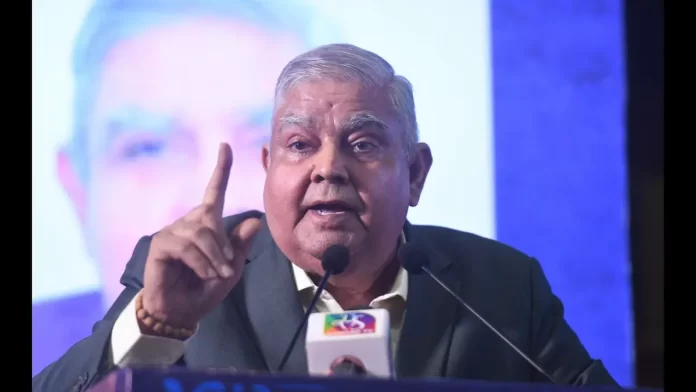Vice President Jagdeep Dhankhar on Friday said that the basic of the basic structure is primacy of the will of the people and that in a democracy, there can be nothing more basic than the prevalence of the rights of the people.
“We must keep only one thing in mind that the interest of Bharat is above everything else”, said the vice President while delivering the 8th LM Singhvi Lecture.
He also reminded the Judiciary about respecting the will of people as is reflected through a legitimised mechanism which is the legislature in a sanctified manner.
“We have a fairly representative parliament of which there is no parallel even at a global level”, he said.
The Vice President said that the preamble of Indian constitution talks about “we the people” which means the power resides in the people and the Indian parliament reflects the minds of the people their mandate their wisdom.
Issue of National Judicial Appointment Commission 2015
Talking about the National Judicial Appointment Commission 2015, he said that the entire Lok Sabha and Rajya Sabha had voted for it unanimously without any abstention or dissension.
Yet this power of the people, which was expressed through a legitimate platform was brazenly undone by the unelected judiciary.
“The world does not know of any such instance”, the Vice President said while asking the “judicial elite class” and intellectuals to find out a parallel in the world where a constitutional provision can be undone in this manner.
Constitution empowers court only to interpret a Provision
The Vice President said that Indian constitution provides in explicit terms Article 145(3) that interpretation of the constitution can be done by the court “when a substantial question of law is involved”
But “nowhere it says that a provision can be run down” by the Constitutional Courts, said the Vice President.
“If a constitutional provision that carries the ordainment of people at large in such a vibrant democracy, is undone, what will happen?” he asked.
He said that these are the issues that should not be viewed on partisan lines.
“I’m startled that after this verdict, there was no whispering in the parliament. It was taken as such. This is too serious an issue.”, he added.
He said that after 9/11 terror attacks, the United States passed the Patriot Act adding that even though it was not passed with a great majority, it was still accepted by Americans and World because the primacy of national interest must always prevail.
Doctrine of Separation of Power Fundamental to Governance
He said that it is never too late to reflect and think. Our judiciary is one of the critical institutions of governance long with the executive and legislature. The doctrine of separation of powers is fundamental to our governance.
The harmonious working of these institutions is vital for the growth of democracy. Any incursion, howsoever subtle, in the domain of one by another has the capacity to unsettle the apple cart of governance.
We have a parliament that is far more representative at the moment.
The Vice President appealed to generate a public opinion that political stance should be distanced from sublimity of our constitutional functioning.
With respect to the Basic Structure Doctrine, he said that we have lived with it even though it was by a majority of only 7 to 6.
Finally the Vice President cautioned the court about compromising the parliamentary sovereignty which he said reflected the true will of people.
He also asked whether a succeeding parliament have to be bound by what has been done by an earlier parliament.
